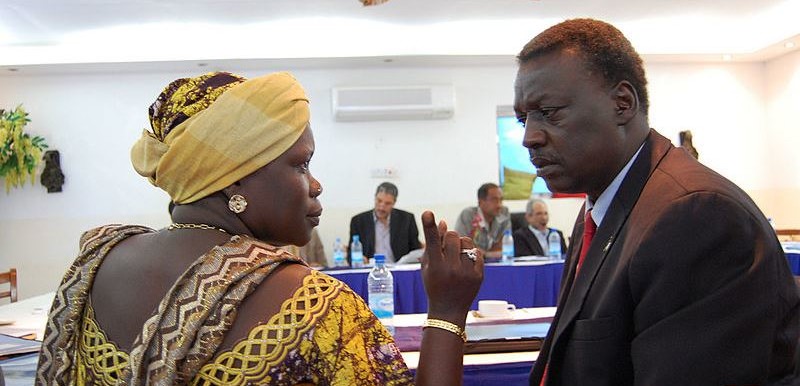South Sudan’s ruling party is set to meet today at the level of the Political Bureau to review key party documents and to fix the date of its planned extraordinary convention. The convention will potentially be delayed until after a cabinet reshuffle, according to a top party official.
The party leadership has already twice delayed the convention, which was scheduled for December and then re-scheduled again for February. In light of the recent reshuffle within the security organs, party leaders may be trying to resolve internal differences prior to the convention.
In an interview with Radio Tamazuj, the SPLM Deputy Secretary General Anne Itto confirmed “The leadership met to adjust the date. Now it is agreed that the Political Bureau will meet on the 5th. Once the Political Bureau meets and passes these documents, the draft of the basic documents, it will be easier to set the date for the extraordinary convention.”
Referring to the recent reshuffling within the armed forces, Itto stated that the president was merely fulfilling his promise from last July to reduce the size of his government and indicated that the reshuffling was not yet complete, as some are calling for the removal of several more army generals.
The senior party official also disclosed that she expects reshuffling within the cabinet which, she claims, is a necessity under current austerity measures. President Salva Kiir, the party chairman, has been urged publically by some party figures including Luka Biong Deng to form a leaner cabinet, owing to the shortage of cash in the country as oil production remains at zero.
Itto also attributed the delay to ongoing preparatory measures. She said that incorporating documents from different organs takes time, explaining that the party formed a committee last year which drafted and distributed the documents to all of the country’s ten states as well as Abyei. After suggestions and revisions, they are to be reviewed by party organs then presented at the convention for approval.
Power struggles in several states, meanwhile, have further confused efforts to initiate the convention and diverted attentions from planning to crisis management. A dispute in January between the governor of Upper Nile, Simon Kun, and the state SPLM secretary general, John Kor Dieu, is yet to be fully resolved following an effort by the governor to expel the party leader.
Meanwhile, the governor of Northern Bahr-el-Ghazal state, Paul Malong, is said to remain at loggerheads with Aguer Wol, the former state assembly speaker who last year lost his job along with six other MPs after a dispute over the 2011 state budget.
Aguer Wol has appealed his case before the Council of States, the upper house of South Sudan’s legislature, where he was reportedly cleared of wrongdoing and recommended for reinstatement to his post — although the president is yet to sign off on this.
“The Council of States formed a committee to go and investigate and after investigation it has postponed everything and has resolved that I should return to my post and the six others to the parliament. The resolution is waiting the president’s signature,” stated Aguer.
There are other states which suffer similar problems between the executive and the parliament. Some party leaders caution that internal differences, if not well handled well, could lead to further fragmentation such as led to the creation of SPLM-DC in 2009.
Photo: Dr. Anne Itto and Dr. Luka Biong of the SPLM speak with each other during trilateral meetings between the U.S., SPLM, and NCP, 19 August 2009 (Flickr/Sudan Envoy)




